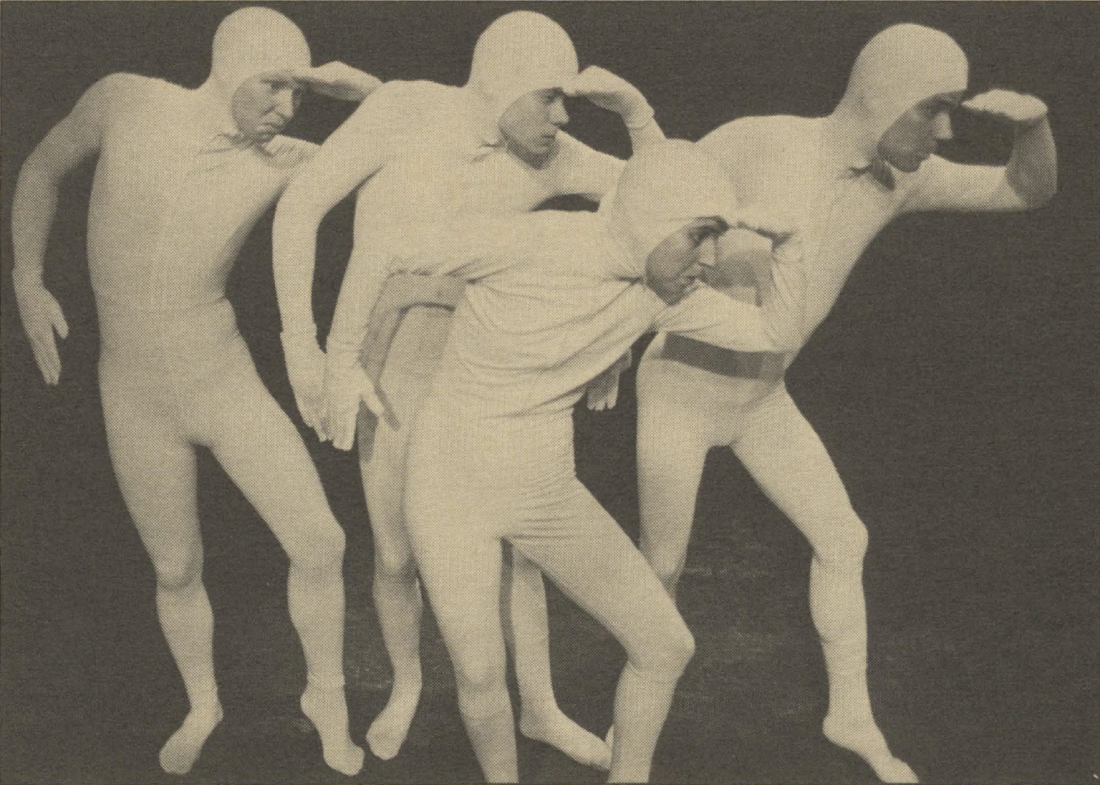Gas Station Theatre Summer Season ‘87
The Gas Station Theatre’s first summer season launched four Manitoba plays, exposing the theatre’s audience to the wide range of theatrical activity currently available in the city. Dogs with No Tails, a comedy by Bruce McManus, opened the season and was followed by a pair of Alan Williams’ plays, Rock Is Dead and Fun in Manitoba. The final show was Mimeworks’ Dirty Laundry, a satirical mime revue.
The decision to run a summer program evolved from the Gas Station Board’s mandate to foster the development of local Manitoba arts groups. Invitations were extended to arts groups to apply for inclusion in November, 1986. Seven groups applied and the Board selected three. Although there was no requirement that the plays be written by local writers, as it turned out, the four selected were all created and produced locally. Joanne Cormier, executive director for the Gas Station Theatre, believes the groups selected provided “a good mix,” which fell under the general umbrella of “lighthearted summer theatre.”
The success of McManus’ We’ve Always Been Friends, presented by Les Dolles and The Gas Station last summer, provided the impetus for this summer’s season, so it made sense to begin with McManus’ Dogs with No Tails. The earlier play told the story of three women who discover they are all going out with the same, almost-perfect man. This year’s Dogs, a companion piece to the first play, is about three men who encounter two women at a bar. Both plays describe the friendship among members of the same sex and both explore the tensions produced by involvement with the opposite sex.
What did Dogs have to say about the relationships between men and women? The play suggested that they are definitely not simple, that “the times they are a changin’,” and that at some point in all couplings “a hard rain is gonna fall.” The play spoke efficiently and cleverly, and McManus’ witty and human dialogue was greeted with the laughter of recognition. However, the setting, plot and characters were a little clichéd, and at times this worked against the play’s meaning and success.
Alan Williams’ Rock Is Dead is a pastiche set in the period of late adolescence, with its combination of egotism and vulnerability. Shirley (Patty Jamieson), Norman (Vern Thiessen), Jordan (Michael Nathanson) and April (Tannis Kowalchuk) simultaneously test the boundaries of their egos and seek to entrench their identities through interaction. As a description of the experiences of four young people, Rock Is Dead was clear and coherent. As a play, it was limited by the territory it encompassed.
The play is a reworked version of an earlier Williams’ script, The Last Doors’ Bootleg, presented at the MTC Warehouse in the spring of 1986. Both plays were created by actors independently developing their individual characters, which were then refined through improvisation under Williams’ direction. The story emerged as the characters were tested in different situations. Williams’ writing and rewriting of the script evolved from the actors’ character development, a method based on Williams’ work with the Hull Truck Company in England. Perhaps what was missing in Rock Is Dead was a playwright to provide a reference point beyond the characters themselves, a more active and clearly delineated persona into which each actor could transform himself.

Bobsled, Mimeworks Mime & Story Theatre Co., photograph David Henry.
Williams’ second play of the summer season, Fun in Manitoba, was essentially a satirical Father Knows Best. The play is about a family living in a small town in Manitoba. Dan (Graham Ashmore), the father, runs the recreation centre. His wife Jeannie (Carolyn Gray), originally from the city, now sells Avon, decorates the house and pops tranquilizers (not in that order). Betty (Patty Jamieson), their 18-year-old daughter, plays baseball, and watches TV and her parents with an equal degree of emotional involvement. Debbie (Melanie Wight) is a neighbour and Avon customer; she is also a sorceress who summons spirits in order to find a true friend, in this instance, Jeannie. Fun in Manitoba depicts people who tend to avoid confronting realities of any sort—their own, those of others and especially the possibility of “a larger reality.” This theme is within the modern dramatic tradition of Pinter, Ionesco. But this play, unlike much of Williams’ work, didn’t make any reference outside itself to suggest what these characters were missing. For instance, Debbie’s attitudes are dispiriting in relation to her expression of them, and the family’s pain failed to evoke empathy, since the audience found itself unable to imagine an alternative experience for these rigidly styled characters. In its bitterness, the play remained unsettling in spite of the occasional infusion of humour.
Mimeworks’ Dirty Laundry was a warm-hearted and clear-headed revue. The sketches, performed by individual performers or groups of the six-member troupe, were linked by their common form, recurring themes and the energies of performers Rick Skene (who is also the troupe’s Artistic Director), James Durham, Heidi Hunter, Daniel Koulack, Chris Sigurdson and Jan Skene.
Sports linked several of the sketches and, as a body-oriented activity, provided a good vehicle for the mime. The satirical style played on both the artists’ and the audience’s preoccupation with the human body. Particularly delightful were “Sports Bits,” which featured one push-start, cross-country skier perpetually behind his efficiently gliding companions, Skene’s and Durham’s finely tuned slapstick race to the theme song of Chariots of Fire, and Hunter’s dignified swimmer disintegrating into a terrified dog-paddler.
Exciting mime hinges on the artist’s ability to create a reality and then transform it. In “Mosquito,” Jan Skene’s sunbather became the mosquito which was harassing her. The transformation occurred simply, smoothly and humorously. On the other hand, Rick Skene’s transformation from bird to man in “Hunter” was less satisfying because the piece was pointing to an idea rather than expressing it.
In “Safe Sex 11,” Sigurdson was able to embody some prevailing anxieties as he stretched his condom to cover his entire body in a desperate attempt to ensure “safety.” In an earlier sketch, Sigurdson’s character had been involved with a blow-up doll (Jan Skene). His overtures and responses to this creature were very funny and, at the same time, touchingly vulnerable. When he accidentally pulled his own plug, revealing that he, too, was a blowup doll, the action was less a comic effect (or a neat ending) than a reflection of the artist’s empathy with the hollow man. This sensitivity to the objects of its satire infused the revue with warmth as well as wit.
The summer season at the Gas Station Theatre demonstrated the energy of Winnipeg actors and writers working co-operatively to produce their own material. The Gas Station’s Board of Directors should be pleased to have seen their mandate implemented with such dispatch. ♦
Lee Anne Block is a Winnipeg freelance writer with a special interest in theatre and performance art.

